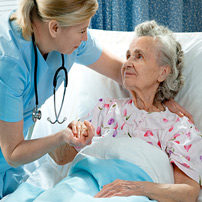Live 24/7 Call Answering: 609-881-1400

We know that deciding to move a loved one into a nursing home can be an emotionally stressful process. Once the decision is made, it take time and patience to research and compare facilities. Families must put their complete trust in the staff and medical personnel to provide quality care and attention to their elderly parent, relative, or friend. When this trust is broken, it is your loved one who suffers the consequences.
Bedsores are pressure wounds that result from a breakdown in the skin. When elderly people are left to lie in bed or sit in a wheelchair for hours on end, these wounds can develop. Many become infected and create a multitude of health complications. What makes the situation worse is knowing that the bed sore could have been prevented with proper care and attention.
If your loved one develops a bed sore, also known as a pressure sore, it is a strong sign that they are being neglected. Bedsores are almost always preventable. They typically form over boney pressure points, such as the sacrum (tailbone area), heels and, less commonly, the elbows, shoulder blades and even the back of the head. In some patients with chronic diseases like diabetes, bedsores or ulcers can be harder to treat, and it may be even more critical that the wounds be avoided in the first place. .
Bedsores can indicate several types of neglect. Many of these pressure wounds develop from positioning. If your loved one is confined to a bed or wheelchair for long periods of time, the bed sore can easily develop if the patient is not moved regularly. Even non-ambulatory patients can be moved from their back to either side, propped up with the aid of pillows or wedges, and repositioned to expose their skin for circulation and air.
The risk of bedsores is increased when a resident suffers from malnutrition and dehydration. If the patient is unable to feed themselves, they can quickly dehydrate and suffer the consequences of malnourishment if someone isn’t taking the time to help them. Malnourishment and dehydration can make a wound harder to heal, which leaves the patient vulnerable to infection. Watch for signs of dry skin and weight loss as another sign of malnutrition and dehydration.
Incontinence is a common problem for elderly people. Some suffer from strictly urinary incontinence, while others experience bowel incontinence. Either form of incontinence requires diligent care and attention. Patients need to be cleaned and have their diapers changed regularly to avoid skin irritation that can lead to bedsores. If bed sheets, blankets, or personal clothing become soiled, they need to be changed and laundered. If you notice that the patient has an odor or is sitting in soiled clothing or bedding, report this to the nurse and case manager immediately.
Families and close friends or relatives that visit a nursing home patient need to be vigilant for signs of nursing home abuse. If the patient complains of pain or discomfort, talk to the nurse or doctor in charge of their care. Investigate their complaint by looking at the area of discomfort and record what you see by picture or note. Inquire on the patient’s status frequently either by personal visit or phone call to the doctor or nurse in charge.
If you notice or suspect that your loved one is suffering from a bedsore due to neglect, you need to take immediate action. Ask your family member, if possible, how the nursing staff is caring for them. If this is not possible, you may be able to gather information by speaking to a roommate, medical assistant, or activities coordinator. Ask questions of nurses, food handlers, and other visitors to see if the patient gets proper attention or nourishment.
Another possible step is to report your suspicions to the appropriate authority at the nursing home. Consider speaking with the nurse manager and the facility administrator. If talking to the medical staff and nursing home management doesn’t improve the situation, then you need to contact a qualified nursing home abuse lawyer, such as the lawyers at Davis & Brusca, LLC, to pursue legal action.
Elderly people who have limited mobility have a higher likelihood of getting bed sores at nursing homes, especially if they do not receive the proper care. Bed sores are a serious medical condition and should not be taken lightly. Here are some common bed sore complications that you should be aware of.
Some nursing home patients are at a higher risk of suffering bed sores than others. For example, those who have limited mobility and lie down too frequently are more likely to develop bed sores. Likewise, patients with diabetes are at greater risk for bed sores, particularly if they also have poor circulation. Nursing homes may attempt to deflect responsibility by blaming these medical conditions. However, it is important to recognize that these conditions are usually only risk factors which, standing alone, are not enough to explain the bed sores. Risk factors must be addressed through the care planning and delivery process. If the nursing home fails to do so, they cannot later “blame” the condition they failed to address for the wound they caused.
Other risk factors for bed sores include incontinence, smoking, obesity, inadequate nutrition, poor fitting shoes and certain medications.
With proper care, bed sores can usually be prevented. For example, nursing home staff members should reposition bedridden patients every couple of hours. If possible, staff members should help patients walk around a little each day. Eating a nutritious diet, wearing shoes that fit and keeping the skin clean and dry can also help to prevent bed sores.